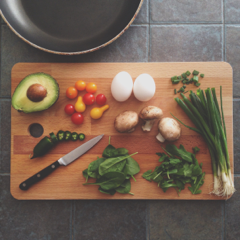搜尋結果
The honeydew melon is one of the two main cultivar types in Cucumis melo Inodorus Group. [3] It is characterized by the smooth, often green or yellowish rind and lack of musky odor. The other main type in the Inodorus Group is the wrinkle-rind casaba melon.
2024年6月11日 · 蜜瓜(Melon/Honeydew Melon)又名香瓜,產於美國、意大利、以色列、日本和南非等地,當造期為5-9月,外表較光滑果皮亦較淺,果肉是淺綠色。 蜜瓜味甘性涼,有潤肺養顏、生津止渴功效。
- Overview
- 1. Rich in Nutrients
- 2. May Help Reduce Blood Pressure
- 3. Contains Nutrients Vital to Bone Health
- 4. May Improve Blood Sugar Control
- 5. Rich in Electrolytes and Water
- 6. May Support Healthy Skin
- 7. May Boost Your Immune System
- 8. May Promote Proper Digestion
- 9. May Support Vision and Eye Health
Honeydew melon supports your body from the inside out, including bone health, digestion, and skin health.
The diverse nutrient profile of honeydew is arguably its most valuable asset.
In fact, the various nutrients and plant compounds may be responsible for its many potential health benefits.
A 1-cup (177-gram) serving of honeydew melon provides (1):
•Calories: 64
•Carbs: 16 grams
•Fiber: 1.4 grams
In general, a diet rich in fruits and vegetables is associated with a reduced risk of high blood pressure and heart disease (3).
More specifically, it’s well established that a low-sodium diet and an adequate potassium intake can positively influence your blood pressure regulation (4).
As honeydew melon is a low-sodium and potassium-rich fruit, it may help you maintain healthy blood pressure levels.
If you’re looking to increase your potassium intake, try adding honeydew to your diet. It’s a good source of potassium, with a 1-cup (177-gram) serving providing 12% of the RDI (1).
Summary Honeydew
melon may help reduce blood pressure due to its high potassium and low sodium
Honeydew melon contains several nutrients that are vital for repairing and maintaining strong bones, including folate, vitamin K and magnesium.
In particular, the melon is a good source of folate — with 1 cup (177 grams) providing 8% of the RDI (1).
Folate is essential for the breakdown of homocysteine — elevated levels of which have been linked to reduced bone mineral density over time (5).
Though more research is needed to draw definitive conclusions on the relationship between folate and bone health, eating foods that contain folate, such as honeydew, may promote healthy bones by ensuring homocysteine levels stay within the normal range (5).
Vitamin K is involved in the production of a major structural protein in bone known as osteocalcin. Therefore, adequate vitamin K intake is essential for healthy bones. A serving of honeydew provides 6% of the RDI of this vitamin (1, 6, 7).
In addition, you can meet about 4% of your daily magnesium needs with one serving of honeydew.
Some research indicates that eating fruits, such as honeydew melon, regularly may promote healthy blood sugar levels.
A recent seven-year study in half a million people found that those who consumed fresh fruit daily were 12% less likely to develop diabetes, compared to those who rarely ate fruit (9).
In those participants who already had diabetes at the beginning of the study, eating fruit at least three times per week led to a 13–28% lower risk of experiencing diabetes-related health complications in addition to a 17% lower risk of premature death (9).
Though honeydew melon contains carbs that can raise your blood sugar temporarily, it also provides fiber and other nutrients that may help improve blood sugar control over time.
Summary Regularly
eating fruit, such as honeydew melon, is associated with a lower risk of
When you think of hydration, the first thing that probably comes to mind is water. However, to effectively and properly hydrate, your body needs more than that — it needs electrolytes, too (10).
Honeydew melon is about 90% water and contains electrolytes, such as potassium, magnesium, sodium and calcium (1).
This combination of water and nutrients makes honeydew great for hydrating after a workout, during illness or if you’re just trying to stay hydrated throughout your day.
Summary Honeydew
melon is made up of mostly water but also contains electrolytes that may
hydrate you more effectively than just water alone.
Eating honeydew melon may support healthy skin due to its high vitamin C content.
Adequate vitamin C intake is imperative for the proper production of collagen, a major structural protein that’s vital for repairing and maintaining your skin tissue (11).
Additionally, because vitamin C is a powerful antioxidant, some research indicates that it may protect your skin against sun damage (12).
Honeydew melon is an excellent source of vitamin C — a single cup (177 grams) provides 53% of the RDI (1).
Though you can obtain vitamin C from a variety of foods, eating honeydew is an easy way to quickly meet your daily needs — promoting healthy skin in the process.
Summary Honeydew
Vitamin C is arguably best known for its role in supporting immune function, and honeydew melon is loaded with it.
The human immune system is complex and requires a wide array of nutrients to function properly — vitamin C is a critical component (13).
In fact, research suggests that adequate intake of dietary vitamin C may both prevent and treat various respiratory and systemic infections, such as pneumonia and the common cold (13).
A 1-cup (177-gram) serving of honeydew provides over half of the RDI for vitamin C, making it a great food to add to your diet as you prepare for this year’s cold season (1, 13).
Summary Honeydew
melon contains high levels of vitamin C, a nutrient that supports proper immune
Honeydew melon contains fiber, a nutrient that is well known for improving digestive health (14).
Adequate intake of dietary fiber slows blood sugar response and promotes bowel regularity and the growth of healthy gut bacteria (14, 15).
A single cup (177 gram) provides about 1.5 grams or roughly 5% of the RDI for fiber. Though many other fruits contain more fiber per serving, honeydew can still contribute to your daily fiber intake (1).
In fact, for some people with certain digestive disorders or those who are newly introducing or reintroducing fiber into their diet, a lower-fiber fruit like honeydew may be better tolerated than other high-fiber foods.
Summary Honeydew
melon contains fiber, a nutrient known to support healthy digestion. Due to its
Honeydew melon contains two potent antioxidants: lutein and zeaxanthin (16).
These carotenoid compounds are well known for supporting eye health and preventing the development of age-related vision loss (16).
Research indicates that regularly eating foods that contain these antioxidants, such as honeydew melon, may support proper eye function throughout your life (16, 17).
Summary Honeydew
melon contains lutein and zeaxanthin, two antioxidants that are known to
support healthy eyes and vision.
蜜露甜瓜 ( 英语 : Honeydew (melon) ) ( Honeydew type ),瓜皮光滑洁净,如昂蒂布白瓜( Blanc d'Antibes,即狭义的蜜露瓜)、白兰瓜。 伯爵甜瓜( Earl's type )即阿露斯蜜瓜( アールスメロン )、玫珑蜜瓜,瓜皮密布网纹,如伯爵最爱( アールスフェボリ ...
2024年8月13日 · Honeydew melon is a nutritious summer fruit with key nutrients, including vitamin C and water. It’s also been linked to better skin health and protection against chronic diseases,...
2024年6月30日 · Honeydew melons are large, oval melons with a smooth rind and pale center. They are a healthy, high-volume food, filling and hydrating, and are low in calories, fat, and protein. Honeydew melons provide some fiber and several essential micronutrients, including vitamin C and potassium, making them a nutritious addition to almost any eating pattern.
2022年12月28日 · Honeydew melon makes for a sweet-tasting and refreshing treat that can take the sting out of the sweltering summer heat. It belongs to the vine-growing Cucurbitaceae family of fruits or the muskmelon family and is a close kin to other popular melons such as watermelon and cantaloupe.
honeydew melon 相關
廣告上個月有 超過 100 萬 名用戶曾瀏覽 temu.com
Browse thousands of brands and find deals on your favorites at Temu®, Shop Now. Awesome Prices & High Quality Here On Temu®. New Users Enjoy Free Shipping & Free Return.
Williams-Sonoma flyer poster this week: many products are 40% off. Check out the product discounts in Williams-Sonoma weekly ads and get coupons

























